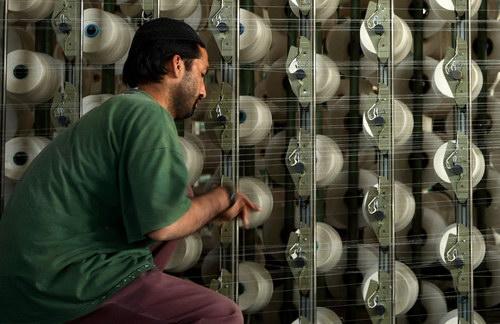
A worker checks spools of thread in a textile factory in Karachi, Pakistan. The country is attempting to export more non-traditional goods, such as marble, leather goods, food and minerals, to China. [Photo/Agencies]
With free-trade agreements, officials aim to double bilateral trade by 2015
BEIJING - More Chinese investment in Pakistan, especially in the energy, infrastructure, agriculture and technology sectors, will help lift the nation's economy to a new high, Pakistan's leader said.
Prime Minister Yousuf Raza Gilani called it a "win-win scenario".
Gilani, who began a four-day state visit to China on Tuesday, made the remarks at the Pakistan-China Entrepreneurs Forum held on Thursday.
Pakistani officials said their country could export more non-traditional goods such as "marble, leather, food and minerals" to China under the framework of China-Pakistan free-trade agreements (FTA), to realize the target of almost doubling bilateral trade to $15 billion by 2015. In the past, Pakistan exported mostly textile goods.
"As China diversifies its economy, with special emphasis on the development of its western regions, and shifts to high technology, the economic transition makes it attractive for Chinese companies to relocate and establish manufacturing bases in Pakistan," Gilani said.
"I would urge Chinese corporations to focus on Pakistan in their strategic business plans."
The sectors that hold huge potential for Chinese companies are "infrastructure, energy and natural resources".
Pakistan suffered heavy monsoon flooding last year and incurred huge losses. Its government is now attempting to reinvigorate the economy, discussing with China a second joint five-year economic and trade program, as the first one expires this year.
"Pakistan is a developing country, and our strategic priority is development. We are developing infrastructure, not only in railroad links, but also building new cities, airports and expressways," Gilani said.
China has helped Pakistan build the port of Gwadar, in Balochistan, and the Karakoram Highway, connecting northern Pakistan to western China.
However, the unstable political situation and shortage of energy resulted in foreign direct investment (FDI) in Pakistan declining during recent months. According to Pakistan's central bank, FDI decreased by 28.6 percent to $1.23 billion in the 10 months leading up to April.
"As the political situation stabilizes and the economy keeps growing, there will be increased potential for investment, and Pakistan's exports will gradually pick up," said Wan Gang, China's minister of science and technology, at the forum.
The coming years will see more investment in "energy, infrastructure, telecommunications and agriculture," he said.
China Mobile Ltd, the world's largest mobile operator by market value, is planning to buy Pakistan operations from its parent, China Mobile Communications Corp, said China Mobile's Chairman Wang Jianzhou on Thursday.
The Asian Development Bank predicted that Pakistan's economy would grow by a moderate 2.5 percent in 2011, and by 3.7 percent in 2012.
In 2006, the two countries signed the FTA, bringing more Chinese investment into Pakistan. By 2010, it had invested an accumulated $1.37 billion in Pakistan, according to the Ministry of Commerce, and in 2010 alone, the figure was $26.1 million.
"The investment is relatively large, and it is mainly in energy," Tariq Puri, chief executive of the Trade Development Authority of Pakistan, told China Daily.
After Thursday's forum, Ruba Group, Pakistan's leading industrial and trade group, signed agreements with the energy companies China Huadian Group and Tebian Electrical Apparatus Stock Co.
In late 2006, when the bilateral FTA was signed, the Pakistan-China Special Economic Zone was established, the first such zone China established overseas. The zone aims to facilitate Chinese investment into Pakistan, especially in the manufacturing sector.
China's Minister of Commerce Chen Deming said bilateral trade could reach $15 billion by 2015.
"As the China-Pakistan FTA is gradually implemented, such a goal will easily be reached," said Wan.
Puri agreed. "The bilateral trade would be probably more than that then."
Pakistan is China's second-largest trade partner in South Asia. In 2010, bilateral trade grew by 27.7 percent from a year earlier to $8.67 billion, with exports increasing by 25.5 percent to $6.94 billion and imports by 37.2 percent to $1.73 billion.
China exports chemicals, telecommunications equipment and machinery to Pakistan, and it imports textiles and minerals.





